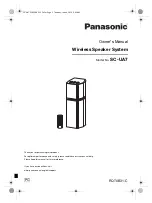
46
English
Glossary
Analogue:
Sound that has not been turned
into numbers. Analogue sound varies, while
digital sound has specifi c numerical values.
These sockets send audio through two
channels, the left and right.
Aspect ratio:
The ratio of vertical and
horizontal sizes of a displayed image. The
horizontal vs. vertical ratio of conventional
TVs is 4:3, and that of wide-screens is 16:9.
Bit Rate:
The amount of data used to hold
a given length of music; measured in kilobits
per second, or kbps. Or, the speed at which
you record. Generally, the higher the bit
rate, or the higher the recording speed, the
better the sound quality. However, higher bit
rates use more space on a disc.
Chapter:
Sections of a picture or a music
piece on a DVD that are smaller than titles.
A title is composed of several chapters. Each
chapter is assigned a chapter number
enabling you to locate the chapter you want.
Disc menu:
A screen display prepared for
allowing a selection of images, sounds,
subtitles, multi-angles, etc to be recorded on
a DVD.
DivX:
The DivX code is a patent-pending,
MPEG-4 based video compression
technology, developed by DivXNetworks,
Inc., that can shrink digital video to sizes
small enough to be transported over the
internet, while maintaining high visual quality.
Dolby Digital:
A surround sound system
developed by Dolby Laboratories containing
up to six channels of digital audio (front left
and right, surround left and right, centre and
subwoofer).
Dolby Surround Pro Logic II:
It is an
improved matrix decoding technology that
provides better spatiality and directionality
on Dolby Surround programme material,
provides a convincing three dimensional
sound fi eld on conventional stereo music
recordings and is ideally suited to bring the
surround experience to automotive sound.
While conventional surround programming
is fully compatible with Dolby Surround Pro
Logic II decoders, soundtracks will be able to
be encoded specifi cally to take full advantage
of Pro Logic II playback, including separate
left and right surround channels. (Such
material is also compatible with conventional
Pro Logic decoders).
DTS:
Digital Theatre Systems. This is a
surround sound system, but it is different
from the Dolby Digital. The formats were
developed by different companies.
JPEG:
A very common digital still picture
format. A still picture data compression
system proposed by the Joint Photographic
Expert Group, which features a small
decrease in image quality in spite of its high
compression ratio.
MP3:
A fi le format with a sound data
compression system. “MP3” is the
abbreviation of Motion Picture Experts
Group 1 (or MPEG-1) Audio Layer3. By
using the MP3 format, one CD-R or CD-RW
can contain about 10 times more data than a
regular CD.
Multichannel:
DVDs are formatted to have
each sound track constitute one sound fi eld.
Multichannel refers to a structure of sound
tracks having three or more channels.




































